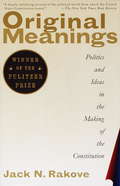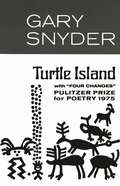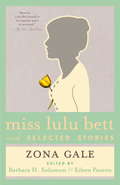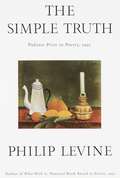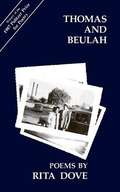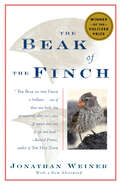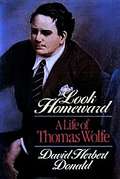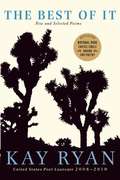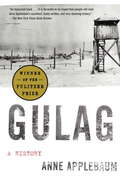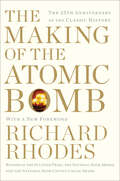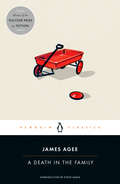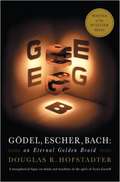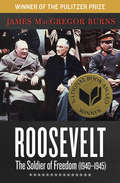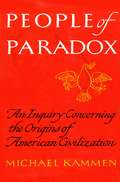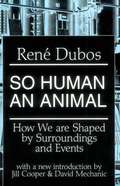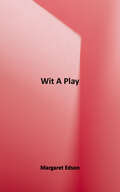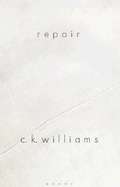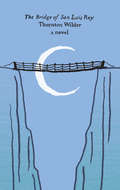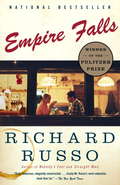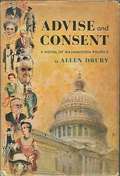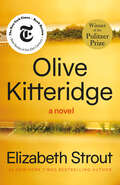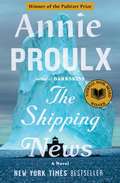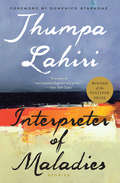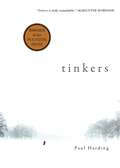Special Collections
Pulitzer Prize Award Winners
Description: Bookshare is pleased to offer the following titles, winners of the Pulitzer Prize Award. Note: Some drama winners are available and are listed under Fiction awards. #award
- Table View
- List View
Original Meanings
by Jack N. RakoveFrom abortion to same-sex marriage, today's most urgent political debates will hinge on this two-part question: What did the United States Constitution originally mean and who now understands its meaning best? Rakove chronicles the Constitution from inception to ratification and, in doing so, traces its complex weave of ideology and interest, showing how this document has meant different things at different times to different groups of Americans.
Pulitzer Prize Winner
Turtle Island
by Gary SnyderWinner of the Pulitzer Prize for Poetry (1975). These Pulitzer Prize-winning poems and essays by the author of No Nature range from the lucid, lyrical, and mystical to the political. All, however, share a common vision: a rediscovery of North America and the ways by which we might become true natives of the land for the first time.
Miss Lulu Bett and Selected Stories
by Zona GaleLulu Bett lives in a small town with her sister Ina and Ina's husband Dwight-a dentist who rules his household with self-righteous smugness. The unmarried Lulu has learned that she cannot question her role as chief cook, housekeeper, and gracious presence. But when Dwight's sophisticated brother Ninian comes to visit, Lulu finds in herself a surprising wit-and the boldness to accept his playful proposal of marriage. Through her appealing, determined heroine, Zona Gale satirically dispatches a sheaf of the social assumptions of her day, from male supremacy to the security of marriage. First published in 1920, Miss Lulu Bett was immediately acclaimed, and went on to become one of two bestselling novels of the year. Together with four of Gale's short stories-including the O. Henry award-winning "Bridal Pond"-Miss Lulu Bett reflects Gale's broad progressive interests and the fast-paced, affecting prose which made her one of the most popular writers of her time and a classic American storyteller.
Pulitzer Prize Winner
The Simple Truth
by Philip LevineWritten in a voice that moves between elegy and prayer, The Simple Truth contains thirty-three poems whose aim is to weave a complex tapestry of myth, history (both public and private), family, memory, and invention in a search for truths so basic and universal they often escape us all.
Winner of the Pulitzer Prize
Thomas And Beulah
by Rita DoveStory told in poems of the African Amarican poet's grandparents' marriage, migration to Akron, Ohio in the first half of the 20th Century.
Pulitzer Prize 1987.
The Beak of the Finch
by Jonathan WeinerPULITZER PRIZE WINNER • A dramatic story of groundbreaking scientific research of Darwin's discovery of evolution that "spark[s] not just the intellect, but the imagination" (Washington Post Book World). &“Admirable and much-needed.... Weiner&’s triumph is to reveal how evolution and science work, and to let them speak clearly for themselves.&”—The New York Times Book ReviewOn a desert island in the heart of the Galapagos archipelago, where Darwin received his first inklings of the theory of evolution, two scientists, Peter and Rosemary Grant, have spent twenty years proving that Darwin did not know the strength of his own theory. For among the finches of Daphne Major, natural selection is neither rare nor slow: it is taking place by the hour, and we can watch.In this remarkable story, Jonathan Weiner follows these scientists as they watch Darwin's finches and come up with a new understanding of life itself. The Beak of the Finch is an elegantly written and compelling masterpiece of theory and explication in the tradition of Stephen Jay Gould.
Look Homeward
by David Herbert DonaldThomas Wolfe, one of the giants of twentieth-century American fiction, is also one of the most misunderstood of our major novelists. A man massive in his size, his passions, and his gifts, Wolfe has long been considered something of an unconscious genius, whose undisciplined flow of prose was shaped into novels by his editor, the celebrated Maxwell Perkins.
Pulitzer Prize Winner
Gulag
by Anne ApplebaumPULITZER PRIZE WINNER • This magisterial and acclaimed history offers the first fully documented portrait of the Gulag, from its origins in the Russian Revolution, through its expansion under Stalin, to its collapse in the era of glasnost.&“A tragic testimony to how evil ideologically inspired dictatorships can be.&” –The New York Times The Gulag—a vast array of Soviet concentration camps that held millions of political and criminal prisoners—was a system of repression and punishment that terrorized the entire society, embodying the worst tendencies of Soviet communism. Applebaum intimately re-creates what life was like in the camps and links them to the larger history of the Soviet Union. Immediately recognized as a landmark and long-overdue work of scholarship, Gulag is an essential book for anyone who wishes to understand the history of the twentieth century.
The Making of the Atomic Bomb
by Richard Rhodes**Winner of the Pulitzer Prize, the National Book Award, and the National Book Critics Circle Award** The definitive history of nuclear weapons—from the turn-of-the-century discovery of nuclear energy to J. Robert Oppenheimer and the Manhattan Project—this epic work details the science, the people, and the sociopolitical realities that led to the development of the atomic bomb.This sweeping account begins in the 19th century, with the discovery of nuclear fission, and continues to World War Two and the Americans’ race to beat Hitler’s Nazis. That competition launched the Manhattan Project and the nearly overnight construction of a vast military-industrial complex that culminated in the fateful dropping of the first bombs on Hiroshima and Nagasaki.Reading like a character-driven suspense novel, the book introduces the players in this saga of physics, politics, and human psychology—from FDR and Einstein to the visionary scientists who pioneered quantum theory and the application of thermonuclear fission, including Planck, Szilard, Bohr, Oppenheimer, Fermi, Teller, Meitner, von Neumann, and Lawrence. From nuclear power’s earliest foreshadowing in the work of H.G. Wells to the bright glare of Trinity at Alamogordo and the arms race of the Cold War, this dread invention forever changed the course of human history, and The Making of The Atomic Bomb provides a panoramic backdrop for that story. Richard Rhodes’s ability to craft compelling biographical portraits is matched only by his rigorous scholarship. Told in rich human, political, and scientific detail that any reader can follow, The Making of the Atomic Bomb is a thought-provoking and masterful work.
A Death in the Family
by James Agee and Steve EarlePublished in 1957, two years after its author's death at the age of forty-five, A Death in the Family remains a near-perfect work of art, an autobiographical novel that contains one of the most evocative depictions of loss and grief ever written.
As Jay Follet hurries back to his home in Knoxville, Tennessee, he is killed in a car accident-a tragedy that destroys not only a life, but also the domestic happiness and contentment of a young family.
A novel of great courage, lyric force, and powerful emotion, A Death in the Family is a masterpiece of American literature.
Pulitzer Prize Winner
Gödel, Escher, Bach
by Douglas R. HofstadterThis groundbreaking Pulitzer Prize-winning book sets the standard for interdisciplinary writing, exploring the patterns and symbols in the thinking of mathematician Kurt Gödel, artist M.C. Escher, and composer Johann Sebastian Bach.
Winner of the National Book Award
Pulitzer Prize Winner
Roosevelt
by James MacGregor BurnsThe &“engrossing&” Pulitzer Prize and National Book Award–winning history of FDR&’s final years (Barbara Tuchman). The second entry in James Macgregor Burns&’s definitive two-volume biography of Franklin Delano Roosevelt begins with the president&’s precedent-breaking third term election in 1940, just as Americans were beginning to face the likelihood of war. Here, Burns examines Roosevelt&’s skillful wartime leadership as well as his vision for post-war peace. Hailed by William Shirer as &“the definitive book on Roosevelt in the war years,&” and by bestselling author Barbara Tuchman as &“engrossing, informative, endlessly readable,&” The Soldier of Freedom is a moving profile of a leader gifted with rare political talent in an era of extraordinary challenges, sacrifices, heroism, and hardship.
People of Paradox
by Michael KammenFrom the beginning, what has given our culture its distinctive texture, pattern, and thrust, according to Michael Kammen, is the dynamic interaction of the imported and the indigenous. He shows how, during the years of colonization, some ideas and institutions were transferred virtually intact from Britain, while, simultaneously, others were being transformed in the New World. As he unravels the tangled origins of our culture, he makes us see that unresolved contradictions in the American experience have created our national style. Puritanical and hedonistic, idealistic and materialistic, peace-loving and war-mongering: these opposing strands go back to the genesis of our history.
Pulitzer Prize Winner
So Human an Animal
by René DubosIn this collection of stories, the bizarre is rendered normal, the absurd hilarious and the incredible comprehensible. The re-imaginations of reality feature evocations of historical figures, over-televised game show hosts and late-night comedians.
Pulitzer Prize Winner
Wit
by Margaret EdsonMost of the action, but not all, takes place in a room of the University Hospital Comprehensive Cancer Center. The stage is empty, and furniture is roiled on and off by the technicians. Jason and Kelekian wear lab coats, but each has a different shirt and tie every time he enters. Susie wears white jeans, white sneakers, and a different blouse each entrance. Scenes are indicated by a line role in the script; there is no break in the action between scenes, but there might be a change in lighting. There is no intermission. Vivian has a central-venous-access catheter over her le{ breast, so the IV tubing goes there, not into her arm. The IV pole, with a Port-a-Pump attached, rolls easily on wheels. Every time the IV pole reappears, it has a different configuration of bottles.
Repair
by C. K. WilliamsRepair is body work in C. K. Williams's sensual poems, but it is also an imaginative treatment of the consternations that interrupt life's easy narrative. National Book Critics Circle Award-winner Williams keeps the self in repair despite love, death, social disorder, and the secrets that separate and join intimates. These forty poems experiment with form but maintain what Alan Williamson has heralded Williams for having so steadily developed from French influences: "the poetry of the sentence".
Pulitzer Prize Winner
The Bridge of San Luis Rey
by Thornton Wilder"On Friday noon, July the twentieth, 1714, the finest bridge in all Peru broke and precipitated five travelers into the gulf below." With this celebrated sentence, Thornton Wilder begins The Bridge of San Luis Rey, one of the towering achievements in American fiction and a novel read throughout the world.By chance, a monk witnesses the tragedy. Brother Juniper seeks to prove that it was divine intervention rather than chance that led to the deaths of those who perished in the tragedy. His study leads to his own death -- and to the author's timeless investigation into the nature of love and the meaning of the human condition.The Bridge of San Luis Rey is now reissued in this handsome hardcover edition featuring a new foreword by Russell Banks. Tappan Wilder has written an engaging and thought-provoking afterword, which includes unpublished notes for the Pulitzer Prize-winning novel, illuminating photographs, and other remarkable documentary material. Granville Hicks's insightful comment about Wilder suggests an inveterate truth: "As a craftsman he is second to none, and there are few who have looked deeper into the human heart."
Empire Falls
by Richard RussoNATIONAL BESTSELLER • PULITZER PRIZE WINNER • The bestselling author of Nobody's Fool and Straight Man delves deep into the blue-collar heart of America in a work that overflows with hilarity, heartache, and grace. &“Rich, humorous ... Mr. Russo&’s most seductive book thus far.&” —The New York TimesWelcome to Empire Falls, a blue-collar town full of abandoned mills whose citizens surround themselves with the comforts and feuds provided by lifelong friends and neighbors and who find humor and hope in the most unlikely places, in this Pulitzer Prize-winning novel by Richard Russo. Miles Roby has been slinging burgers at the Empire Grill for 20 years, a job that cost him his college education and much of his self-respect. What keeps him there? It could be his bright, sensitive daughter Tick, who needs all his help surviving the local high school. Or maybe it&’s Janine, Miles&’ soon-to-be ex-wife, who&’s taken up with a noxiously vain health-club proprietor. Or perhaps it&’s the imperious Francine Whiting, who owns everything in town–and seems to believe that &“everything&” includes Miles himself.Look for Richard Russo's new book, Somebody's Fool, coming soon.
Advise and Consent
by Allen DruryThe United States Senate reacts to the nomination of Robert Leffingwell, a former Communist Party member, as United States Secrety of State.
Winner of the Pulitzer Prize.
Olive Kitteridge
by Elizabeth StroutWINNER OF THE PULITZER PRIZE • The beloved first novel featuring Olive Kitteridge, from the #1 New York Times bestselling author of My Name is Lucy Barton and the Oprah&’s Book Club pick Olive, Again &“Fiction lovers, remember this name: Olive Kitteridge. . . . You&’ll never forget her.&”—USA Today &“Strout animates the ordinary with astonishing force.&”—The New YorkerOne of the New York Times&’s 100 Best Books of the 21st CenturyA BEST BOOK OF THE YEAR: The Washington Post Book World, USA Today, San Francisco Chronicle, Chicago Tribune, Seattle Post-Intelligencer, People, Entertainment Weekly, The Christian Science Monitor, The Plain Dealer, The Atlantic, Rocky Mountain News, Library Journal At times stern, at other times patient, at times perceptive, at other times in sad denial, Olive Kitteridge, a retired schoolteacher, deplores the changes in her little town of Crosby, Maine, and in the world at large, but she doesn&’t always recognize the changes in those around her: a lounge musician haunted by a past romance; a former student who has lost the will to live; Olive&’s own adult child, who feels tyrannized by her irrational sensitivities; and her husband, Henry, who finds his loyalty to his marriage both a blessing and a curse.As the townspeople grapple with their problems, mild and dire, Olive is brought to a deeper understanding of herself and her life—sometimes painfully, but always with ruthless honesty. Olive Kitteridge offers profound insights into the human condition—its conflicts, its tragedies and joys, and the endurance it requires. The inspiration for the Emmy Award–winning HBO miniseries starring Frances McDormand, Richard Jenkins, and Bill Murray
The Shipping News
by Annie ProulxWinner of the Pulitzer Prize, Annie Proulx&’s The Shipping News is a vigorous, darkly comic, and at times magical portrait of the contemporary North American family.Quoyle, a third-rate newspaper hack, with a “head shaped like a crenshaw, no neck, reddish hair...features as bunched as kissed fingertips,” is wrenched violently out of his workaday life when his two-timing wife meets her just desserts. An aunt convinces Quoyle and his two emotionally disturbed daughters to return with her to the starkly beautiful coastal landscape of their ancestral home in Newfoundland. Here, on desolate Quoyle’s Point, in a house empty except for a few mementos of the family’s unsavory past, the battered members of three generations try to cobble up new lives. Newfoundland is a country of coast and cove where the mercury rarely rises above seventy degrees, the local culinary delicacy is cod cheeks, and it’s easier to travel by boat and snowmobile than on anything with wheels. In this harsh place of cruel storms, a collapsing fishery, and chronic unemployment, the aunt sets up as a yacht upholsterer in nearby Killick-Claw, and Quoyle finds a job reporting the shipping news for the local weekly, the Gammy Bird (a paper that specializes in sexual-abuse stories and grisly photos of car accidents). As the long winter closes its jaws of ice, each of the Quoyles confronts private demons, reels from catastrophe to minor triumph—in the company of the obsequious Mavis Bangs; Diddy Shovel the strongman; drowned Herald Prowse; cane-twirling Beety; Nutbeem, who steals foreign news from the radio; a demented cousin the aunt refuses to recognize; the much-zippered Alvin Yark; silent Wavey; and old Billy Pretty, with his bag of secrets. By the time of the spring storms Quoyle has learned how to gut cod, to escape from a pickle jar, and to tie a true lover’s knot.
Interpreter of Maladies
by Jhumpa LahiriNavigating between the Indian traditions they've inherited and the baffling new world, the characters in Jhumpa Lahiri's elegant, touching stories seek love beyond the barriers of culture and generations.
In "A Temporary Matter," published in The New Yorker, a young Indian-American couple faces the heartbreak of a stillborn birth while their Boston neighborhood copes with a nightly blackout. In the title story, an interpreter guides an American family through the India of their ancestors and hears an astonishing confession.
Lahiri writes with deft cultural insight reminiscent of Anita Desai and a nuanced depth that recalls Mavis Gallant. She is an important and powerful new voice.
The Emperor of All Maladies
by Siddhartha MukherjeeWINNER OF THE PULITZER PRIZEThe Emperor of All Maladies is a magnificent, profoundly humane "biography" of cancer--from its first documented appearances thousands of years ago through the epic battles in the twentieth century to cure, control, and conquer it to a radical new understanding of its essence. Physician, researcher, and award-winning science writer, Siddhartha Mukherjee examines cancer with a cellular biologist's precision, a historian's perspective, and a biographer's passion. The result is an astonishingly lucid and eloquent chronicle of a disease humans have lived with--and perished from--for more than five thousand years. The story of cancer is a story of human ingenuity, resilience, and perseverance, but also of hubris, paternalism, and misperception. Mukherjee recounts centuries of discoveries, setbacks, victories, and deaths, told through the eyes of his predecessors and peers, training their wits against an infinitely resourceful adversary that, just three decades ago, was thought to be easily vanquished in an all-out "war against cancer." The book reads like a literary thriller with cancer as the protagonist. From the Persian Queen Atossa, whose Greek slave may have cut off her diseased breast, to the nineteenth-century recipients of primitive radiation and chemotherapy to Mukherjee's own leukemia patient, Carla, The Emperor of All Maladies is about the people who have soldiered through fiercely demanding regimens in order to survive--and to increase our understanding of this iconic disease. Riveting, urgent, and surprising, The Emperor of All Maladies provides a fascinating glimpse into the future of cancer treatments. It is an illuminating book that provides hope and clarity to those seeking to demystify cancer.
Tinkers
by Paul HardingAn old man lies dying. As time collapses into memory, he travels deep into his past where he is reunited with his father and relives the wonder and pain of his impoverished New England youth. At once heartbreaking and life affirming, Tinkers is an elegiac meditation on love, loss, and the fierce beauty of nature. Paul Harding has an MFA from the Iowa Writers’ Workshop and teaches creative writing at Harvard. He lives in Georgetown, Massachusetts.
